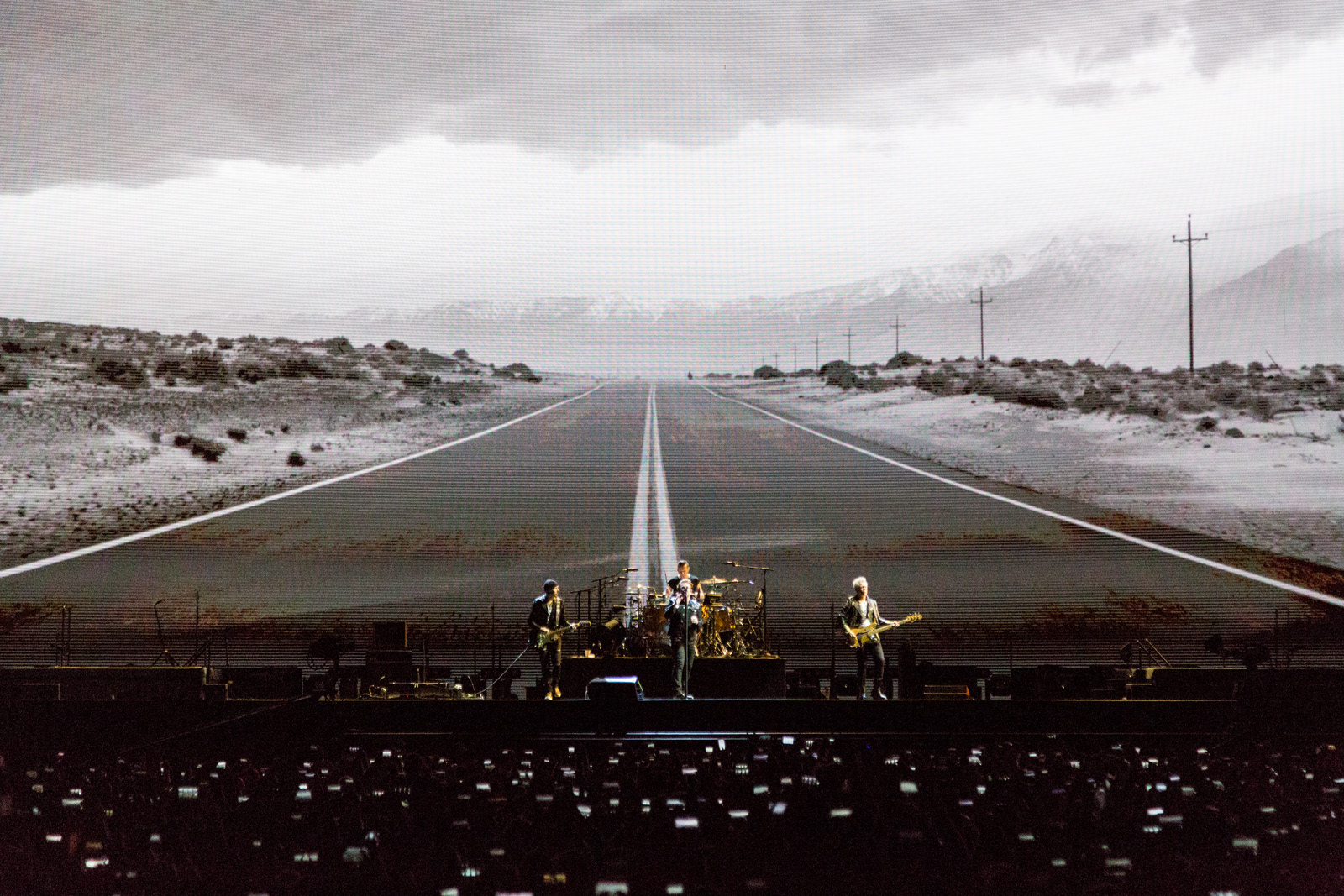Concert review: U2 at the Rose Bowl

U2 celebrated the 30th anniversary of its 1987 album, “The Joshua Tree,” at the Rose Bowl on Saturday night, performing songs like “Sunday Bloody Sunday” and “Where The Streets Have No Name.” (Owen Emerson/Daily Bruin senior staff)
U2
The Joshua Tree Tour
The Rose Bowl
Saturday
By Raunak Devjani
May 21, 2017 5:28 p.m.
This post was updated on May 22 at 5:16 p.m.
U2 released “The Joshua Tree” in 1987, but in 2017 the songs still feel good as new.
On Saturday night, U2’s Bono, the Edge, Adam Clayton and Larry Mullen, Jr. came together on stage to celebrate the 30th anniversary of “The Joshua Tree,” the album inspired by the Irish band’s love for America and its culture. Performing their decades-old classics with youthful vitality, U2 gave the audience a nostalgic evening of ’80s music that was as politically relevant to modern times as it was to events from years ago.
The show opened with Mullen on the drums, starting the night with an upbeat tone with the first song “Sunday Bloody Sunday.” The other three bandmates joined him in the middle of the pit, greeting the Rose Bowl’s roaring crowd.
U2 quickly moved onto its second song, “New Year’s Day,” with Bono calling on the audience to raise their hands up to the sky.
“Hold us up,” he shouted. “We need you.”
Despite his age, 57-year-old Bono still retained a signature raspy edge to his voice. Despite the 30 years between the original “The Joshua Tree” tour and Saturday’s show, the frontman proved he still could pull off sprightly stage antics, from jumping around the stage to dancing with his bandmates.
Bono picked up a large camera and aimed it at his face, then toward the audience. The camera’s live footage played behind him on a screen, which also featured a silver silhouette of a 200-foot-tall Joshua tree, and offered a zoom-in look at the audience’s excited reactions.
The constant cheering that Bono created in the arena dissipated to make room for a more contemplative, emotional space with songs like “With Or Without You” and “Running To Stand Still.” The latter featured a harmonica solo and was dedicated to the late rock musician Chris Cornell, the somber mood a tactful relief from the rest of the fast-paced set.
Bono interacted with the audience by connecting with them over his love for Los Angeles, emphasizing how at home he felt in the city.
“Here we still are, here you still are,” he said. “What a blessing.”
U2’s music is known especially for being politically and socially charged; Saturday’s show remained representative of his beliefs about equality that the band expressed when they first released “The Joshua Tree” – tracks discussed the issues of discrimination and war.
During the performance of “Pride (In The Name Of Love),” words from Martin Luther King Jr.’s speech flashed on the background screen, such as “dream,” “truth” and “wake up.” After the song finished, Bono addressed the audience with a call to action to unite as a country once more.
“The spirit of Dr. King wants to awaken the America of compassion,” Bono said.
The band brought to light the refugee crisis by showing a clip of a young Syrian girl expressing her desire to migrate into America, calling the country a civil land of dreams where one can be happy.
Given the government’s current attitude toward immigrants, the script seemed deviant of reality. Though well-intentioned, the creative execution of the idea seemed incomplete because it did not recognize the racist struggles refugees can face after they find asylum in America.
U2 also screened a clip criticizing the Trump administration; an on-screen character made statements reminiscent to those made by Trump about building a wall.
Between framing America as a utopia for refugees with the first clip and alluding to the president’s plan to build international barriers with the second clip, the projected message was a confused one.
However, U2 compensated well for the flawed delivery of its political views with its performance of “Ultra Violet (Light My Way),” which was dedicated to feminism.
Music was complimented by pop art images of influential women such as Michelle Obama, Ellen Degeneres and Malala Yousafzai on the screen. Bono made an ode to women of the world, encouraging them to stay united and strong.
Ultimately, the band left its loyal audience feeling optimistic and energized. The revival of “The Joshua Tree” tour brought a riveting combination of ancient experience with young exuberance. The men on stage last night may as well have been the 20-something-year-olds from 1987.


